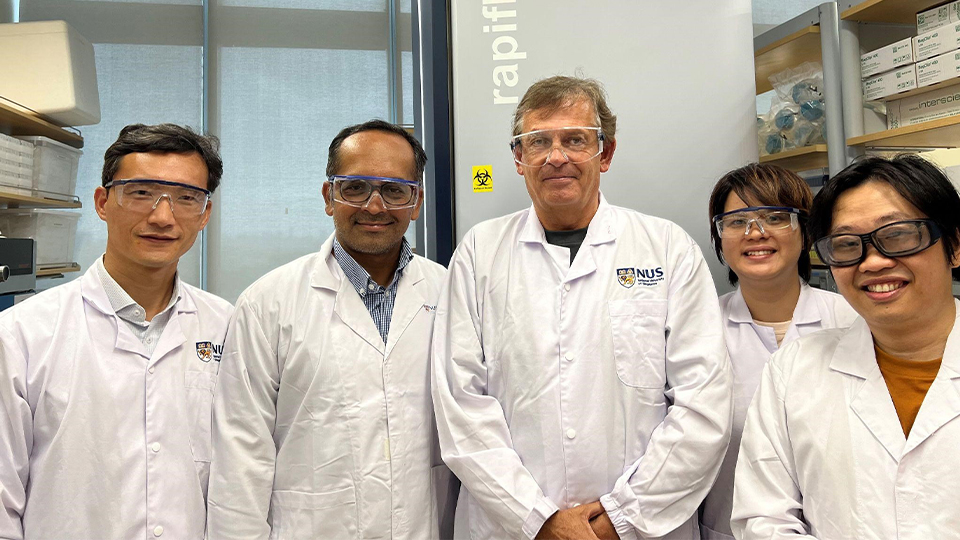New treatment method reduces size and increases stability of atherosclerotic plaque on arterial walls, preventing heart diseases: NUS study
Published: 08 Aug 2023

The research team, comprising Assistant Professor Wang Jiong-Wei from the Department of Surgery, the Nanomedicine Translational Research Programme, Centre for NanoMedicine and Cardiovascular Research Institute at the Yong Loo Lin School of Medicine, National University of Singapore (NUS Medicine); Associate Professor Glenn Kunnath Bonney from the Department of Surgery at the National University Hospital and the Director & Principal Investigator of SurgiCAL ProtEomics Laboratory (SCALPEL), iHealthtech, NUS; Professor Gerrit Storm from the Department of Surgery and Nanomedicine Translational Research Programme at NUS Medicine; Ms Chong Suet Yen, PhD student at the Department of Surgery and Cardiovascular Research Institute at NUS Medicine; and Dr Looi Wen Donq, Application Specialist at Bruker Daltonics. Credits: NUS Yong Loo Lin School of Medicine
Atherosclerosis is a disease in which fat, cholesterol, and other substances build up inside artery walls. This can lead to plaque formation, which can block arteries and cause heart attacks and strokes. It is the leading cause of coronary heart disease, and is responsible for an estimated 17.9 million deaths in 2020.
In Singapore, 21 people die from heart disease and stroke every day, accounting for 32% of all deaths in 2021, making it the top disease burden in Singapore.
Early interventions include lifestyle modifications and medications to lower blood cholesterol are desirable and effective for most patients. Docosahexaenoic acid (DHA), an omega-3 fatty acid, has been shown to have anti-inflammatory and antioxidant properties, which could help to prevent the buildup of fatty deposits in arteries– a major cause of heart attacks and strokes. DHA supplements are often consumed orally, but most are poorly absorbed by the gut.
To improve the absorption of DHA in the bloodstream, a research team led by Assistant Professor Wang Jiong-Wei from the Department of Surgery, the Nanomedicine Translational Research Programme, Centre for NanoMedicine and Cardiovascular Research Institute, at the Yong Loo Lin School of Medicine, National University of Singapore (NUS Medicine), and Professor Gerrit Storm from the Department of Surgery and Nanomedicine Translational Research Programme at NUS Medicine, worked on laboratory models to deliver DHA to the bloodstream that could be more effective than oral consumption–via DHA liposomes, a form of nanomedicine. This study is published in the Journal of Controlled Release.
In collaboration with Associate Professor Glenn Bonney, Senior Consultant, Division of Hepatobiliary & Pancreatic Surgery, and Director of Research, Department of Surgery, National University Hospital, the researchers employed a state-of-the-art mass spectrometry imaging technology to analyse the plaque.
It revealed that DHA liposomes can restore the lipid balance in the artery to that of healthy arteries in which less harmful lipids are present. These results suggest that DHA liposomes could be a promising new treatment for atherosclerosis.
“This is the first study to demonstrate that an injectable nanoformulation can remarkably improve the therapeutic effects of DHA against atherosclerosis at a dose of 40,000 to 400,000 times lower than reported usage of oral DHA. We are optimistic about the clinical benefits it may bring to our patients, and are exploring clinical trials on patients in the near future,” said Asst Prof Wang.
Click here to read the media release.

